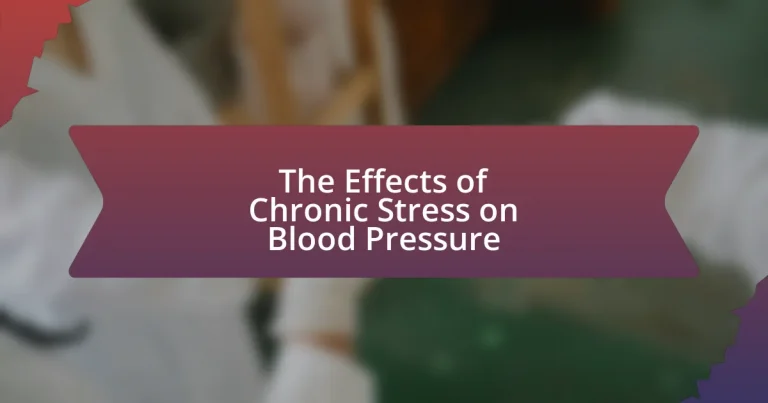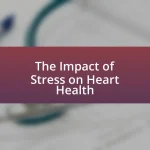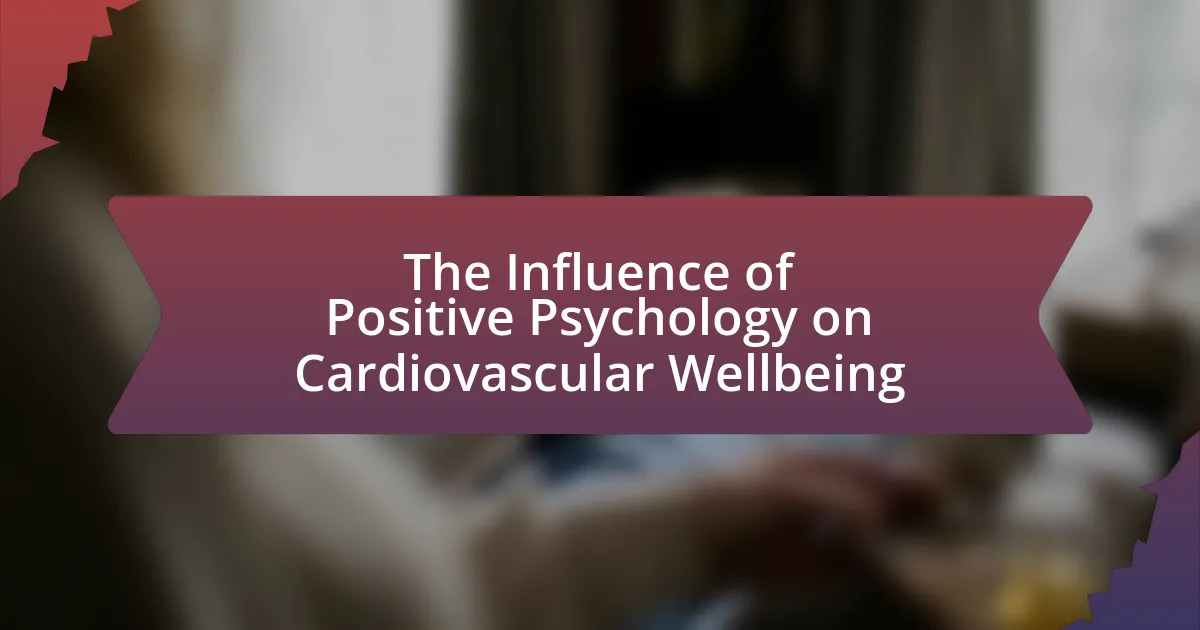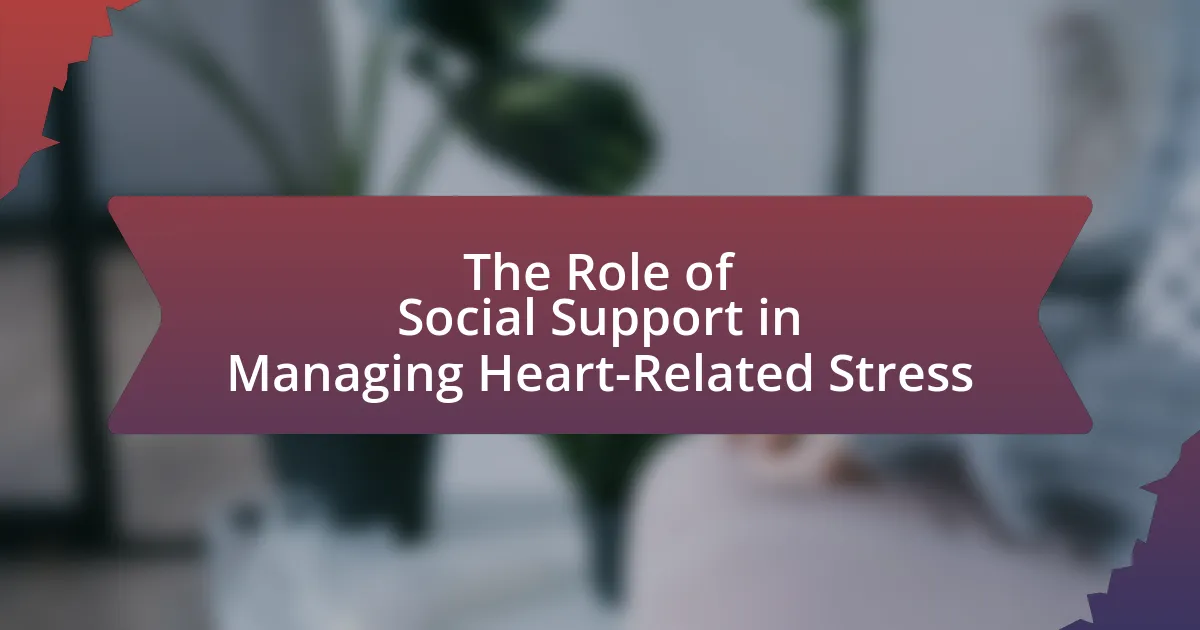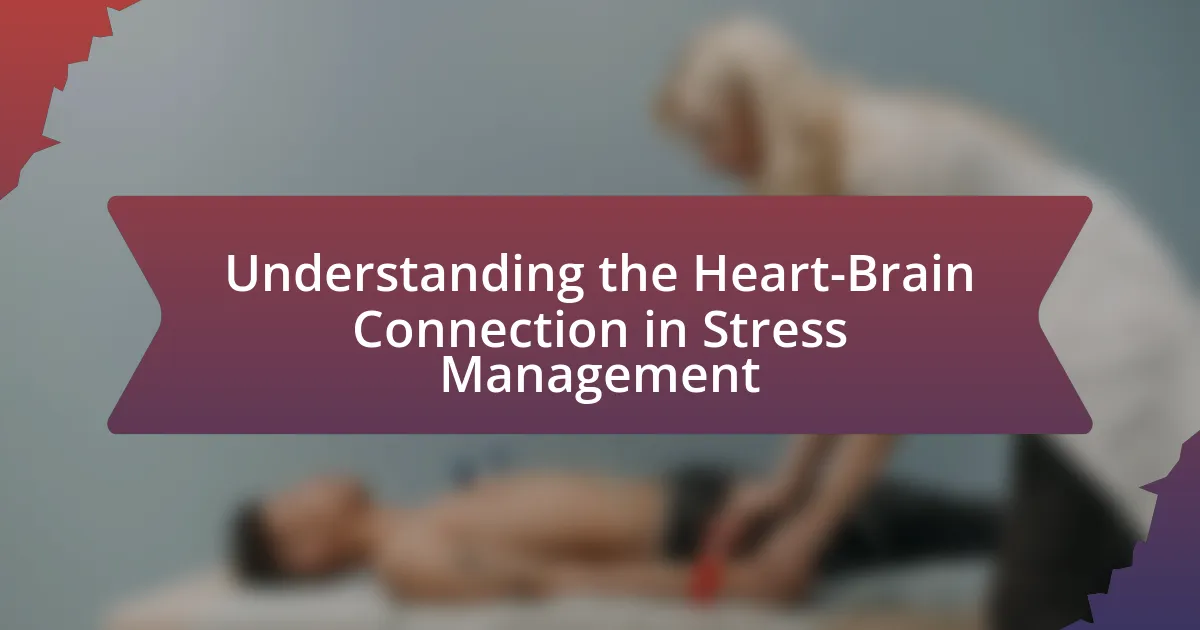Chronic stress is a significant factor contributing to elevated blood pressure, as it triggers the release of stress hormones like cortisol and adrenaline, leading to increased heart rate and blood vessel constriction. Research indicates that individuals experiencing chronic stress are at a higher risk of developing hypertension, with studies showing that effective stress management techniques can lower blood pressure levels. The article explores the physiological mechanisms linking chronic stress to hypertension, the immediate and long-term effects on blood pressure, and the role of lifestyle factors, genetics, and social support in moderating these effects. Additionally, it discusses practical strategies for managing stress and reducing its impact on blood pressure, emphasizing the importance of exercise, diet, and relaxation techniques.
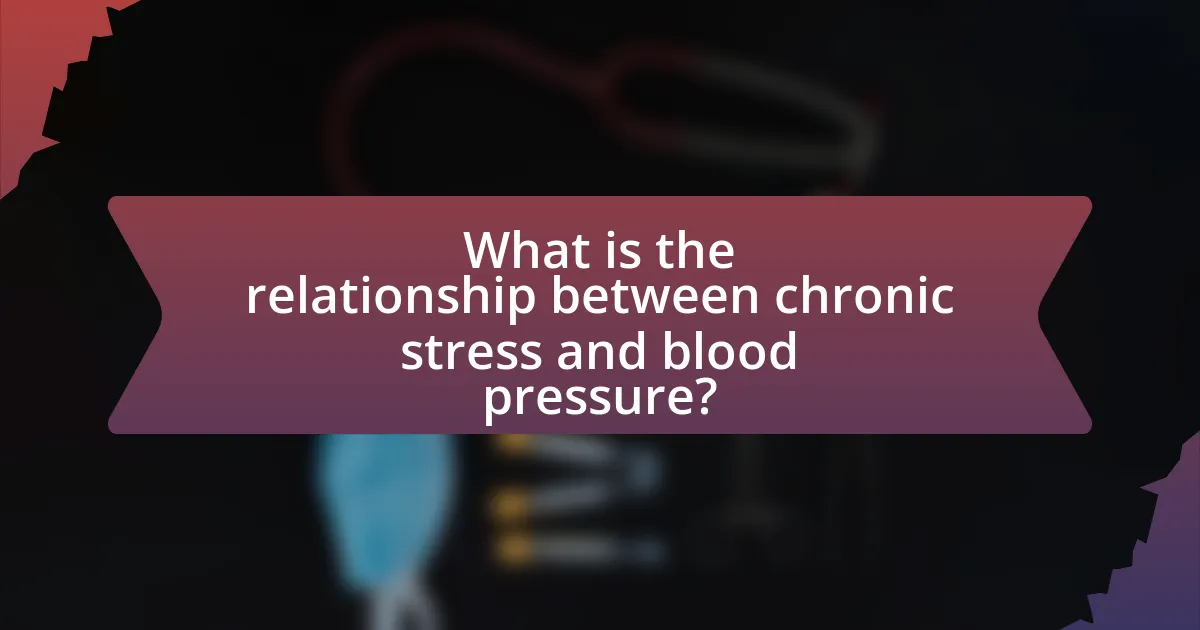
What is the relationship between chronic stress and blood pressure?
Chronic stress is directly linked to elevated blood pressure. When an individual experiences prolonged stress, the body releases stress hormones such as cortisol and adrenaline, which can lead to increased heart rate and constriction of blood vessels, resulting in higher blood pressure levels. Studies indicate that individuals with chronic stress are more likely to develop hypertension, with research showing that stress management techniques can significantly lower blood pressure readings. For instance, a study published in the Journal of Hypertension found that participants who engaged in stress-reduction practices experienced a notable decrease in systolic and diastolic blood pressure.
How does chronic stress influence blood pressure levels?
Chronic stress significantly increases blood pressure levels by activating the body’s stress response system, which releases hormones such as cortisol and adrenaline. These hormones lead to increased heart rate and constriction of blood vessels, resulting in elevated blood pressure. Research indicates that individuals experiencing prolonged stress can develop hypertension, with studies showing that chronic stress is associated with a 50% higher risk of developing high blood pressure compared to those with lower stress levels.
What physiological mechanisms link chronic stress to increased blood pressure?
Chronic stress leads to increased blood pressure primarily through the activation of the hypothalamic-pituitary-adrenal (HPA) axis, which results in elevated levels of cortisol. This hormone promotes vasoconstriction and increases heart rate, both of which contribute to higher blood pressure. Additionally, chronic stress triggers the sympathetic nervous system, leading to the release of catecholamines like adrenaline, which further elevate blood pressure by increasing cardiac output and peripheral resistance. Studies have shown that individuals experiencing prolonged stress exhibit consistently higher blood pressure readings, reinforcing the connection between stress and hypertension.
How do hormones released during stress affect cardiovascular function?
Hormones released during stress, such as cortisol and adrenaline, significantly impact cardiovascular function by increasing heart rate and blood pressure. Cortisol promotes the retention of sodium and water, leading to increased blood volume, while adrenaline stimulates the heart to pump faster and constricts blood vessels, further elevating blood pressure. Research indicates that chronic exposure to these stress hormones can lead to persistent hypertension and increase the risk of cardiovascular diseases, as evidenced by studies showing that individuals with high stress levels often exhibit elevated blood pressure readings and greater incidence of heart-related conditions.
What are the short-term and long-term effects of chronic stress on blood pressure?
Chronic stress leads to both short-term and long-term increases in blood pressure. In the short term, stress activates the body’s fight-or-flight response, resulting in the release of hormones like adrenaline and cortisol, which temporarily elevate blood pressure by increasing heart rate and constricting blood vessels. Long-term exposure to stress can lead to sustained high blood pressure, or hypertension, as the body remains in a heightened state of alertness, causing persistent strain on the cardiovascular system. Studies indicate that individuals with chronic stress are at a higher risk for developing hypertension, with research showing that stress management can significantly lower blood pressure levels over time.
How does chronic stress lead to hypertension over time?
Chronic stress leads to hypertension over time primarily through the activation of the body’s stress response system, which increases the production of stress hormones like cortisol and adrenaline. These hormones cause blood vessels to constrict and heart rate to increase, resulting in elevated blood pressure. Over prolonged periods, this continuous elevation in blood pressure can damage blood vessels and the heart, contributing to the development of hypertension. Research indicates that individuals experiencing chronic stress are at a significantly higher risk for hypertension, with studies showing that stress management can lead to reductions in blood pressure levels.
What are the immediate effects of stress on blood pressure readings?
Stress immediately elevates blood pressure readings due to the body’s fight-or-flight response, which releases hormones like adrenaline and cortisol. These hormones increase heart rate and constrict blood vessels, leading to a temporary rise in blood pressure. Research indicates that acute stress can cause systolic blood pressure to increase by 10 to 20 mmHg and diastolic pressure to rise by 5 to 15 mmHg. This physiological response is a normal reaction to stressors, but repeated episodes can contribute to long-term hypertension.
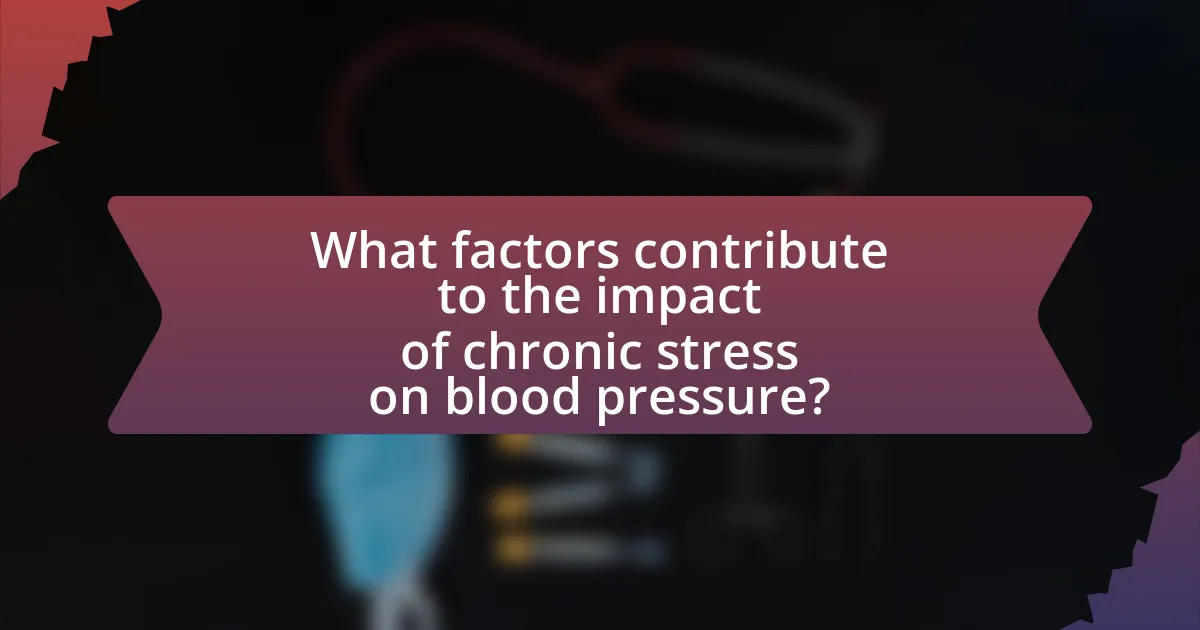
What factors contribute to the impact of chronic stress on blood pressure?
Chronic stress significantly impacts blood pressure primarily through the activation of the body’s stress response system, which includes the release of hormones such as cortisol and adrenaline. These hormones lead to increased heart rate and constriction of blood vessels, resulting in elevated blood pressure. Additionally, chronic stress can contribute to unhealthy behaviors such as poor diet, lack of exercise, and smoking, which further exacerbate hypertension. Research indicates that individuals experiencing prolonged stress are at a higher risk for developing hypertension, with studies showing that stress management techniques can effectively lower blood pressure levels.
How do individual differences affect the response to chronic stress?
Individual differences significantly influence the response to chronic stress, affecting physiological and psychological outcomes. Factors such as genetics, personality traits, coping mechanisms, and social support systems contribute to how individuals experience and manage stress. For instance, research indicates that individuals with a high level of neuroticism are more likely to perceive stressors as threatening, leading to heightened physiological responses, including increased blood pressure. Conversely, those with effective coping strategies, such as problem-solving skills and social support, tend to exhibit lower stress reactivity and better health outcomes. Studies have shown that chronic stress can lead to hypertension, particularly in individuals with a predisposition to anxiety or depression, highlighting the importance of individual differences in stress responses.
What role do genetics play in stress-induced blood pressure changes?
Genetics significantly influence stress-induced blood pressure changes by affecting individual responses to stressors. Genetic variations can impact the regulation of the autonomic nervous system and the hypothalamic-pituitary-adrenal (HPA) axis, which are critical in managing stress responses. For instance, polymorphisms in genes related to adrenergic receptors and cortisol metabolism have been associated with heightened blood pressure reactivity during stress. Studies have shown that individuals with specific genetic profiles may exhibit greater increases in blood pressure when exposed to stress, highlighting the role of hereditary factors in cardiovascular responses.
How does lifestyle influence the effects of chronic stress on blood pressure?
Lifestyle significantly influences the effects of chronic stress on blood pressure by determining individual responses to stressors and overall cardiovascular health. For instance, unhealthy lifestyle choices such as poor diet, lack of physical activity, and smoking can exacerbate the impact of chronic stress, leading to higher blood pressure levels. Research indicates that individuals who engage in regular physical activity and maintain a balanced diet rich in fruits, vegetables, and whole grains experience lower blood pressure and better stress management. A study published in the Journal of Hypertension found that individuals with a sedentary lifestyle had a 30% higher risk of developing hypertension when exposed to chronic stress compared to those who exercised regularly. Thus, lifestyle factors play a crucial role in modulating the relationship between chronic stress and blood pressure.
What environmental factors exacerbate the effects of chronic stress on blood pressure?
Environmental factors such as high noise levels, air pollution, and socioeconomic stressors exacerbate the effects of chronic stress on blood pressure. High noise levels, particularly in urban areas, have been linked to increased blood pressure due to the body’s stress response to persistent auditory stimuli. Air pollution contributes to cardiovascular issues by causing inflammation and oxidative stress, which can elevate blood pressure. Additionally, socioeconomic stressors, including financial instability and lack of access to healthcare, create chronic stress that negatively impacts blood pressure regulation. Studies indicate that individuals living in areas with high pollution and noise levels experience higher rates of hypertension, reinforcing the connection between these environmental factors and chronic stress effects on blood pressure.
How do work-related stressors impact blood pressure levels?
Work-related stressors significantly elevate blood pressure levels. Chronic exposure to stressors such as high demands, tight deadlines, and interpersonal conflicts can lead to sustained activation of the body’s stress response, resulting in increased heart rate and vascular resistance. Research indicates that individuals experiencing high levels of work-related stress are at a greater risk for hypertension, with studies showing that workplace stress can raise systolic blood pressure by an average of 5 to 10 mmHg. This physiological response is linked to the release of stress hormones like cortisol and adrenaline, which constrict blood vessels and increase blood flow, ultimately contributing to long-term cardiovascular issues.
What is the effect of social support on stress and blood pressure?
Social support significantly reduces stress and lowers blood pressure. Research indicates that individuals with strong social networks experience lower levels of cortisol, a stress hormone, which in turn helps to maintain healthier blood pressure levels. For instance, a study published in the Journal of Health and Social Behavior found that perceived social support is associated with lower blood pressure readings, particularly in stressful situations. This effect is attributed to the buffering role of social support, which mitigates the physiological responses to stress, thereby promoting cardiovascular health.
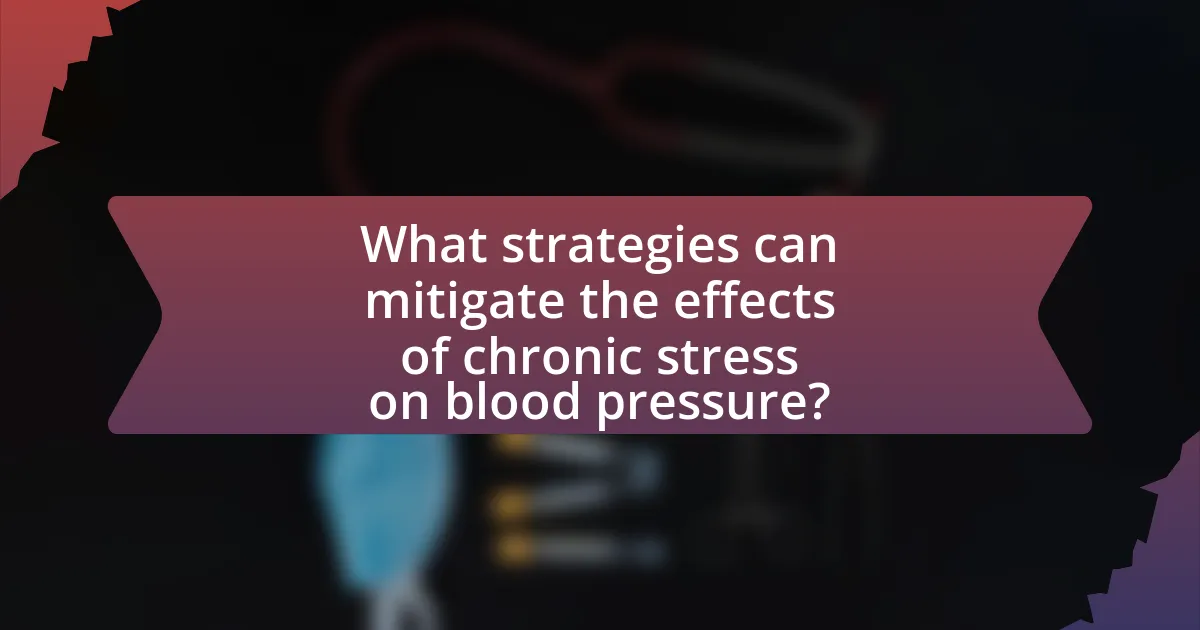
What strategies can mitigate the effects of chronic stress on blood pressure?
Regular physical activity can significantly mitigate the effects of chronic stress on blood pressure. Engaging in aerobic exercises, such as walking, running, or cycling, has been shown to lower blood pressure by improving heart health and reducing stress hormones. A study published in the Journal of Hypertension found that individuals who participated in regular physical activity experienced a reduction in systolic blood pressure by an average of 4-9 mmHg. Additionally, mindfulness practices, including meditation and yoga, can help lower stress levels and subsequently reduce blood pressure. Research from the American Heart Association indicates that mindfulness-based stress reduction techniques can lead to a decrease in blood pressure by promoting relaxation and reducing anxiety. Furthermore, maintaining a balanced diet rich in fruits, vegetables, and whole grains can support overall cardiovascular health and help manage blood pressure levels. The DASH (Dietary Approaches to Stop Hypertension) diet has been specifically linked to lower blood pressure, emphasizing the importance of nutrition in stress management.
How can lifestyle changes help manage stress and blood pressure?
Lifestyle changes can significantly help manage stress and blood pressure by promoting healthier habits and reducing risk factors. Regular physical activity, for instance, has been shown to lower blood pressure and alleviate stress through the release of endorphins, which enhance mood. A study published in the Journal of Clinical Hypertension found that engaging in moderate exercise can reduce systolic blood pressure by an average of 4-9 mmHg.
Additionally, adopting a balanced diet rich in fruits, vegetables, whole grains, and low in sodium can improve cardiovascular health and lower blood pressure. The DASH (Dietary Approaches to Stop Hypertension) diet specifically emphasizes these food groups and has been proven to reduce blood pressure levels significantly.
Practicing mindfulness techniques such as meditation and deep breathing can also effectively reduce stress levels. Research from the American Psychological Association indicates that mindfulness practices can lower cortisol levels, a hormone associated with stress, thereby contributing to better blood pressure regulation.
Furthermore, ensuring adequate sleep is crucial, as poor sleep quality is linked to increased stress and higher blood pressure. The Centers for Disease Control and Prevention (CDC) states that adults should aim for 7 or more hours of sleep per night to maintain optimal health.
In summary, lifestyle changes such as regular exercise, a balanced diet, mindfulness practices, and sufficient sleep can collectively manage stress and lower blood pressure effectively.
What role does exercise play in reducing stress and lowering blood pressure?
Exercise plays a significant role in reducing stress and lowering blood pressure by promoting the release of endorphins, which are natural mood lifters. Engaging in physical activity helps to decrease levels of the body’s stress hormones, such as adrenaline and cortisol. Research indicates that regular aerobic exercise can lead to a reduction in systolic and diastolic blood pressure, with studies showing that individuals who engage in moderate-intensity exercise for at least 150 minutes per week can lower their blood pressure by 5 to 10 mmHg. This physiological response not only alleviates stress but also contributes to overall cardiovascular health, making exercise a vital component in managing stress and hypertension.
How can dietary modifications impact stress levels and blood pressure?
Dietary modifications can significantly reduce stress levels and lower blood pressure. Consuming a diet rich in fruits, vegetables, whole grains, and lean proteins has been shown to improve overall mental health and reduce anxiety, which in turn can lead to lower blood pressure. For instance, the DASH (Dietary Approaches to Stop Hypertension) diet emphasizes nutrient-dense foods and has been clinically proven to lower blood pressure by an average of 5-6 mmHg in individuals with hypertension. Additionally, omega-3 fatty acids found in fish and nuts can decrease stress hormones and promote a sense of calm, further contributing to lower blood pressure.
What relaxation techniques are effective in managing stress and blood pressure?
Effective relaxation techniques for managing stress and blood pressure include deep breathing exercises, progressive muscle relaxation, mindfulness meditation, and yoga. Deep breathing exercises, such as diaphragmatic breathing, have been shown to lower heart rate and blood pressure by promoting relaxation and reducing stress hormones. Progressive muscle relaxation involves systematically tensing and relaxing muscle groups, which can decrease anxiety and lower blood pressure. Mindfulness meditation encourages present-moment awareness, leading to reduced stress and improved cardiovascular health, as evidenced by studies indicating lower blood pressure in practitioners. Yoga combines physical postures, breathing techniques, and meditation, which have been linked to significant reductions in stress and blood pressure levels, supported by research published in the Journal of Clinical Hypertension.
How does mindfulness meditation affect stress and blood pressure?
Mindfulness meditation significantly reduces stress and lowers blood pressure. Research indicates that regular practice of mindfulness meditation can lead to decreased levels of cortisol, the stress hormone, which in turn helps to alleviate stress. A meta-analysis published in the journal Health Psychology Review found that mindfulness meditation is associated with a reduction in blood pressure, particularly in individuals with hypertension. This effect is attributed to the relaxation response triggered by mindfulness practices, which promotes vasodilation and improves cardiovascular health.
What are the benefits of deep breathing exercises for stress management?
Deep breathing exercises significantly reduce stress by activating the body’s relaxation response. This physiological change lowers heart rate and blood pressure, counteracting the effects of chronic stress. Research published in the Journal of Clinical Psychology indicates that deep breathing can decrease cortisol levels, a hormone associated with stress, thereby promoting a sense of calm and well-being. Additionally, a study by Brown and Gerbarg (2005) found that controlled breathing techniques improve emotional regulation and reduce anxiety, further supporting their effectiveness in stress management.
What practical tips can individuals implement to reduce chronic stress and its impact on blood pressure?
To reduce chronic stress and its impact on blood pressure, individuals can implement several practical strategies. Regular physical activity, such as aerobic exercises, has been shown to lower blood pressure and reduce stress levels by releasing endorphins, which improve mood. Mindfulness practices, including meditation and deep-breathing exercises, can significantly decrease stress hormones and promote relaxation, leading to better blood pressure control. Additionally, maintaining a balanced diet rich in fruits, vegetables, whole grains, and lean proteins can support overall health and mitigate stress effects on blood pressure. Social support from friends and family also plays a crucial role in stress reduction, as positive relationships can buffer against stressors. According to the American Heart Association, these lifestyle changes can lead to a significant decrease in blood pressure and improve overall well-being.
